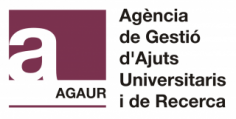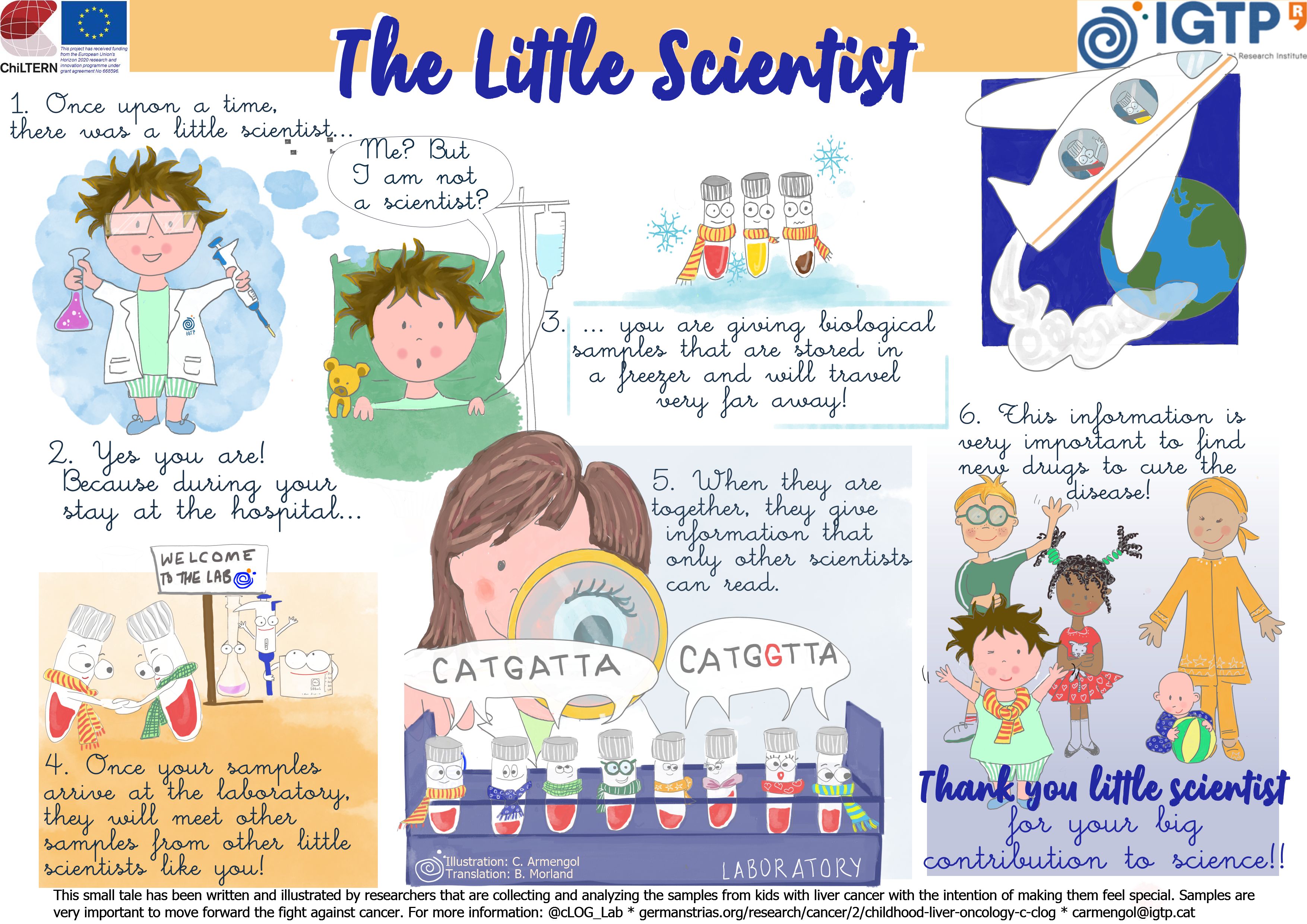About
The Childhood Liver Oncology Group (c-LOG), is a pioneering translational research team dedicated to improving survival rates and quality of life for children diagnosed with liver cancer, with a primary focus on hepatoblastoma but also in hepatocellular carcinoma in children, both rare cancers. While liver cancer in children generally has a good prognosis, survival is poor for patients with aggressive and chemo resistant tumours. Furthermore, survivors often suffer lifelong secondary effects due to high doses of chemotherapy. Due to the rarity of these diseases (approximately one case per million), they have made significant efforts to collect samples from affected infants and children as the foundation of its research. The team addresses the challenge of understanding the underlying causes of these diseases to develop improved treatment strategies and risk stratification algorithms aimed at increasing patient survival and minimizing chemotherapy-related side effects.
To accomplish these objectives, they established the Childhood Liver Cancer Network Collection (CLCN), a comprehensive European biorepository of biological samples from paediatric liver cancer patients. This resource was developed in collaboration with the Paediatric Hepatic International Tumour Trial (PHITT) and through partnerships with hospitals across Europe. Additionally, they collaborate with the Gastroenterology Department at Germans Trias i Pujol University Hospital to collect biological specimens from adult patients with liver diseases, facilitating a broader understanding of liver cancer, including its adult form, hepatocellular carcinoma.
Research efforts focus on several key areas:
- Consolidating a unique European biorepository that serves as a vital resource for current and future translational research.
- Investigating the molecular biology of childhood liver cancer to identify biomarkers and therapeutic targets, particularly for tumours resistant to current therapies.
- Discovering and validating diagnostic and prognostic biomarkers to enhance clinical risk stratification and improve patient management within the context of the PHITT trial, with the aim of applying these findings in future clinical trials.
- Advancing precision medicine by employing patient-derived models, such as xenografts and organoids, to test innovative, individualized therapies tailored to specific tumour subtypes.
The group faces challenges common to rare paediatric cancers, including limited patient numbers and the complexity of translating molecular findings into effective treatments. Nevertheless, their integrative approach -combining clinical collaboration, advanced technologies, and international cooperation- positions it to make significant contributions toward more effective, less toxic therapies, ultimately improving outcomes for children with liver cancer.
Keywords: oncology, cancer, liver cancer, childhood liver cancer, hepatoblastoma.

Group leader
- Carolina Armengol Niell, PhD

Carolina Armengol Niell, PhD
Carolina Armengol Niell has over 27 years of experience in translational liver cancer research, focusing on both pediatric and adult patients. She holds degrees in Biology (1996) and Biochemistry (1998), a PhD in Biochemistry conducted at the Hospital Clínic and Faculty of Medicine of the University of Barcelona (2004), and completed a postdoctoral fellowship at the Institut Pasteur in Paris (2004-2007). Supported by a Ramón y Cajal contract (Ministry of Economic Affairs and Digital Transformation), she founded the Childhood Liver Oncology Group (c-LOG) at IGTP in 2010, which is affiliated with CIBERehd as part of the CB06/04/0033 group, where she also serves as the leader.
Dr Armengol has been a pioneer in translational research on childhood liver cancer in Spain, and her research group is internationally recognized as a reference group in the field. She currently serves as interim biology coordinator for the International Childhood Liver Tumour Strategy Group (SIOPEL). Her research focuses on directly studying patient samples to better understand the disease and translate findings into clinical practice, with the ultimate goal of improving patients' quality of life.
Dr Armengol's work is supported by competitive funding from national and international agencies. She currently leads two coordinated projects at the national and EU levels. She has published extensively in high-impact journals and actively collaborates with industry partners to develop diagnostic devices and novel therapeutic approaches for aggressive liver tumours.
Contact: carmengol(ELIMINAR)@igtp.cat
ORCID: 0000-0002-4690-4027
Team
Postdoctoral fellow
María Manuela Barranco Piazza, PhD, MD(ELIMINAR)
PhD students
Andrea Michelle Castaneda Moreno(ELIMINAR)
Maria Torner Simó(ELIMINAR)
Alvaro del Río Álvarez(ELIMINAR)
Medical hepatologist
Margarita Sala Llinàs(ELIMINAR)
Laboratory technician
Lucia Lozano White(ELIMINAR)
Junior researcher
Queralt Miñarro
Research lines
Establishing a unique European biorepository for childhood liver cancer
They are building a robust network of collaborations with hospitals across Europe to collect biological samples from paediatric patients with liver cancer. This initiative is made possible through the invaluable support of families, paediatric oncologists, surgeons, and pathologists, creating a unique resource for advancing research and treatment.
Unravelling the molecular biology of childhood liver cancer
Their research focuses on deepening the understanding of rare and highly aggressive forms of childhood liver cancer, particularly those resistant to current therapies. Using cutting-edge high-throughput technologies and advanced computational approaches, the group aims to identify critical biomarkers and therapeutic targets to enable the development of more effective treatments.
Diagnostic and prognostic biomarker discovery to enhance patient outcomes
They are committed to identifying and validating diagnostic and prognostic biomarkers using samples from European patients enrolled in the pioneering Paediatric Hepatic International Tumour Trial (PHITT). These efforts are designed to refine clinical risk stratification and improve the management and quality of life of children with liver cancer.
Advancing precision medicine in childhood liver cancer
The group is at the forefront of testing innovative therapies tailored to individual patients. By leveraging advanced patient-derived models, such as xenografts and organoids, they aim to identify therapeutic targets and the most effective drugs for each tumour subtype, paving the way for precision medicine in paediatric liver cancer.
Active projects
Tumour-host interactions in liver cancer of childhood and adults (THRIVE)
PI: Josep M. Llovet; Partner: Carolina Armengol
Funding Agency: European Health and Digital Executive Agency (HaDEA), European Commission
Duration: 01/12/2023 – 30/11/2028
More information

Hub d'innovació pediàtrica - I4KIDS
PI: St Joan de Déu; Collaborator: Carolina Armengol
Funding agency: Agència de Gestió d'Ajuts Universitaris i de Recerca (AGAUR)
Agency code: 2021-XARDI-00006
Duration: 2023 – 2026

Precision medicine for hepatoblastoma: identification of novel therapies and predictive biomarkers using a unique EU biorepository (PMed4HB)
PI: Carolina Armengol
Funding agency: Spanish Association Against Cancer
Agency code: PRYCO223102ARME
Duration: 01/12/2022 - 30/11/2027
More information

Translational research group in hepatic pathology and innate immunity
Funding agency: Agència de Gestió d'Ajuts Universitaris i de Recerca (AGAUR)
Agency code: 2021-SGR-01186

Identification of predictive Biomarkers and novel biology-driven Therapies for Childhood Liver Cancer patients using a unique EU biorepository (BT4ChildLC)
PI: Carolina Armengol
Funding agency: Fight Kids Cancer Program, European Science Foundation
Duration: 2023 – 2025

Robust Learning and Reasoning for Complex Event Forecasting (EVENFLOW)
PI: NCSR; Third party: Carolina Armengol
Funding Agency: European Commission, Horizon Europe
Duration: 01/10/2022 - 30/09/2025
Dissecting the role of the 14q32 region in hepatoblastoma (Hblast14)
PI: P Sancho-Bru; Partner: Carolina Armengol
Funding Agency: Worldwide Cancer Research
Duration: 01/04/2023 - 31/03/2026
Targeting choline metabolism in high-risk hepatoblastoma with a novel release-controlled drug
PI: Carolina Armengol
Funding agency: AGAUR (LLAVOR program)
Agency code: ChilD (2024 LLAV 00109)
Duration: 2024 – 2025
Past projects
Individualized Pediatric Cure, iPC
Funding agency: H2020 Grant Agreement
Agency code: 826121
Duration: 2019 - 2023
Proteomic profiling of tumors from poor-prognosis childhood liver cancer patients
Recipient: Álvaro del Rio Alvarez
Funding agency: FI-AGAUR
Agency code: 2021FI_B 00528
Duration: 01/04/2022 - 31/03/2025
Identificación de dianas moleculares para terapias innovadoras del hepatoblastoma
PI: Carolina Armengol
Funding agency: Center for Biomedical Network Research (CIBER)
Duration: 01/04/2022-31/3/2024
Scientific publications
Highlighted publications
Carrillo-Reixach J, Torrens L, Simon-Coma M, Royo L, Domingo-Sàbat M, Abril-Fornaguera J, Akers N, Sala M, Ragull S, Arnal M, Villalmanzo N, Cairo S, Villanueva A, Kappler R, Garrido M, Guerra L, Sábado C, Guillén G, Mallo M, Piñeyro D, Vázquez-Vitali M, Kuchuk O, Mateos ME, Ramírez G, Santamaría ML, Mozo Y, Soriano A, Grotzer M, Branchereau S, de Andoin NG, López-Ibor B, López-Almaraz R, Salinas JA, Torres B, Hernández F, Uriz JJ, Fabre M, Blanco J, Paris C, Bajčiová V, Laureys G, Masnou H, Clos A, Belendez C, Guettier C, Sumoy L, Planas R, Jordà M, Nonell L, Czauderna P, Morland B, Sia D, Losic B, Buendia MA, Sarrias MR, Llovet JM, Armengol C. Epigenetic footprint enables molecular risk stratification of hepatoblastoma with clinical implications. J Hepatol. 2020 Aug;73(2):328-341. DOI: 10.1016/j.jhep.2020.03.025.
Fang J, Singh S, Cheng C, Natarajan S, Sheppard H, Abu-Zaid A, Durbin AD, Lee HW, Wu Q, Steele J, Connelly JP, Jin H, Chen W, Fan Y, Pruett-Miller SM, Rehg JE, Koo SC, Santiago T, Emmons J, Cairo S, Wang R, Glazer ES, Murphy AJ, Chen T, Davidoff AM, Armengol C, Easton J, Chen X, Yang J et al. Genome-wide mapping of cancer dependency genes and genetic modifiers of chemotherapy in high-risk hepatoblastoma. Nat Commun. 2023 Jul 6; 14(1):4003. DOI: 10.1038/s41467-023-39717-6.
Mario Failli, Salih Demir, Álvaro Del Río-Álvarez; Juan Carrillo-Reixach; Laura Royo, Montserrat Domingo-Sàbat, Margaret Childs, Rudolf Maibach, Rita Alaggio, Piotr Czauderna, Bruce Morland, Roland Kappler, Carolina Armengol, Diego di Bernardo. Computational drug prediction in hepatoblastoma by integrating pan-cancer transcriptomics with pharmacological response. Hepatology, Hepatology. 2023 Sep 20. DOI: 10.1097/HEP.0000000000000601. *co-corresponding
Alex Clavería-Cabello, Jose Maria Herranz, Maria Ujue Latasa, Maria Arechederra, Iker Uriarte, Antonio Pineda-Lucena, Felipe Prosper, Pedro Berraondo, Cristina Alonso, Bruno Sangro, Jose Juan García Marin, Maria Luz Martinez-Chantar, Sergio Ciordia, Fernando José Corrales, Paola Francalanci, Rita Alaggio, Jessica Zucman-Rossi, Emilie Indersie, Stefano Cairo, Montserrat Domingo-Sàbat, Laura Zanatto, Pau Sancho-Bru, Carolina Armengol, Carmen Berasain, Maite García Fernandez-Barrena, Matias Antonio Avila. Identification and experimental validation of druggable epigenetic targets in hepatoblastoma. J Hepatol. 2023 Jun 9:S0168-8278(23)00405-1. DOI: 10.1016/j.jhep.2023.05.031.
Abril-Fornaguera J, Torrens L, Andreu-Oller C, Carrillo-Reixach J, Rialdi A, Balaseviciute U, Pinyol R, Montironi C, Haber PK, Del Río-Álvarez Á, Domingo-Sàbat M, Royo L, Akers NK, Willoughby CE, Peix J, Torres-Martin M, Puigvehi M, Cairo S, Childs M, Maibach R, Alaggio R, Czauderna P, Morland B, Losic B, Mazzaferro V, Guccione E, Sia D, Armengol C*, Llovet JM. Identification of IGF2 as Genomic Driver and Actionable Therapeutic Target in Hepatoblastoma. Mol Cancer Ther. 2023 Feb 10:MCT-22-0335. DOI: 10.1158/1535-7163.MCT-22-0335. *co-last author
Cairo S, Armengol C, De Reyniès A, Wei Y, Thomas E, Renard CA, Goga A, Balakrishnan A, Semeraro M, Gresh L, Pontoglio M, Strick-Marchand H, Levillayer F, Nouet Y, Rickman D, Gauthier F, Branchereau S, Brugières L, Laithier V, Bouvier R, Boman F, Basso G, Michiels JF, Hofman P, Arbez-Gindre F, Jouan H, Rousselet-Chapeau MC, Berrebi D, Marcellin L, Plenat F, Zachar D, Joubert M, Selves J, Pasquier D, Bioulac-Sage P, Grotzer M, Childs M, Fabre M, Buendia MA. Hepatic stem-like phenotype and interplay of Wnt/beta-catenin and Myc signaling in aggressive childhood liver cancer. Cancer Cell. 2008 Dec 9;14(6):471-84. DOI: 10.1016/j.ccr.2008.11.002.
Additional information
Collaborative networks
- CIBEREHD: The Network Centre for Biomedical Research in Hepatic and Digestive Diseases is a consortium with its own legal personality, with no physical contiguity, which aims to promote and cooperate in scientific research, development of knowledge and transferring this to society, in the area of liver and digestive diseases. C. Armengol is leading a multidisciplinary research group distinguished by its clinical, translational, and experimental investigations on various liver diseases: (i) Chronic hepatitis, non-alcoholic fatty liver disease, cirrhosis, and its complications; (ii) Liver cancer: Hepatocellular carcinoma and hepatoblastoma and (iii) Innate immunity in liver disease. More information
- SIOPEL: The International Society of Paediatric Oncology Epithelial Liver Tumours Group. The Association is founded to pursue the following objectives with respect to childhood liver tumours: (i) To develop and conduct comprehensive clinical research programs, (ii) To promote basic and translational research; (iii) To promote worldwide cooperation with cooperative groups that share similar interests; (iv) To develop pre-clinical models to run translational research on rare tumours; (v) To promote scientific and educational events in this field; (vi) To undertake other educational activities in this field. C. Armengol is a member of the interim SIOPEL Board and is currently serving as the provisional head of the Biology Group until the first elections. (SIOPEL website is currently under construction)

Doctoral theses
Title: Towards precision medicine in pediatric liver cancer: discovery and validation of prognostic biomarkers
Author: Juan Carrillo Reixach
Supervisors: Carolina Armengol Niell i Carlos Julian Ciudad Gomez
University: Universitat de Barcelona
Date of defence: 19/12/2022
Title: Biomarker Discovery and Validation Through Clinically Applicable Techniques: Advancing Personalized Medicine in Pediatric Liver Cancer
Author: Álvaro del Río Álvarez
Supervisor: Carolina Armengol Niell
University: University of Barcelona
Date of defence: July, 2025
Outreach
"The Little Scientist" is a small tale written and illustrated to learn about the important role of children with liver cancer in c-LOG's research. It is meant for families and patients with liver cancer. Translations into Spanish, Catalan, French and Polish are on their way!
In case you are interested in the dissemination activites of the c-LOG team including meetings with families of children with liver cancer and parent's associations, please contact us!
News
The CARE Annual Meeting reviews the program’s cancer research activity and sets priorities for the months ahead
The III CARE Annual Meeting, held on 5 December at BCIN, brought together the cancer research community of the Can Ruti Campus for a day focused on scientific dialogue, interdisciplinarity and future strategy.
Can Ruti reaffirms its commitment to rare diseases in an interdisciplinary event
On Friday 28 February, HUGTiP and IGTP held a new edition of their event to mark Rare Disease Day. The event brought together healthcare professionals and researchers to share knowledge and experiences in the field. The program also included the patient perspective in the final part of the event.
Contact
(+34) 93 554 30 72
More links
Follow @cLOG_Lab on X · Donate via Amics de Can Ruti · PMed4HB project website · Follow c-LOG on LinkedIn · Follow @THRIVE_LiverCan on X


